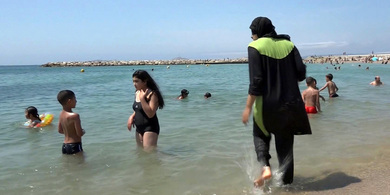
"Access to beaches and for swimming is banned to any person wearing improper clothes that are not respectful of good morals and secularism. Beachwear which ostentatiously displays religious affiliation, when France and places of worship are currently the target of terrorist attacks, is liable to create risks of disrupting public order."
Well I wonder what happened to equality, fraternity and liberty? It’s also rather ironic that full body clothing is thought to be improper and not respectful of good morals while very scanty beachwear is. How would the authorities feel if all women decided to appear on the beaches in burkinis in solidarity with their Muslim sisters? It would be a great sight if it were to happen. And what has happened to modesty, a virtue that seems to have lost its importance today but one that would be upheld by all religions, even if there are different cultural and historical expressions of it?
The ruling of course comes from a place of fear where Muslims have become associated with terrorism and from a country which has had recent experience of terrorist atrocities. It’s understandable that a court in Nice would uphold the Cannes legislation. But to impose a ban on a modest dress only alienates a community and those women within the community who want to dress modestly. And it’s evidence to more extreme forms of Islam that the west is decadent, which unfortunately is often then associated with Christianity. There’s a great cartoon which shows a western woman in a bikini and Muslim woman in a burqa passing one another. The western woman is thinking – everything covered but her eyes, what a cruel male- dominated culture while the Muslim is thinking - nothing covered but her eyes what a cruel male -dominated culture. It’s all in the interpretation – one woman’s liberation is another woman’s oppression.
Women in general and the wearing of the veil in particular have become the ground on which the battle for Islam’s soul seems to be taking place. How women dress and are treated has become a criteria for judging where a country, community or individual is in the continuum between extreme traditionalism and a more liberal approach. Some see it as a sign of women’s oppression and I’ve heard it said often by some people that they will not engage with Islam because of its attitude to women.
The veil is not an Islamic invention. Historians trace it back to Assyria in the 13th century before the common era. It’s been common throughout history for women to cover their head. Orthodox married women do it, some African cultures do it and we have nuns within the Christian tradition who are covered from head to foot as a sign of their religious commitment. For some years I wore a veil though I’m very glad not to do so anymore as I don’t feel the need to distinguish myself in that way. But some sisters still do and want to do so just as some Muslim women want to witness to their faith by wearing the hijab and the fuller veiling of the niqab and burka which seems to be gaining in popularity, at least in my neck of the woods. It’s quite likely that criticising and outlawing it will make some women more determined to witness to their faith in this very public way as a way of exercising religious freedom and as a protest against western cultural imperialism. Perhaps if we were a more equal, integrated society there would not be the same need for it. Motivations for such things can be quite complicated especially as some Muslim women don’t wear the veil and don’t think they are betraying their religion or being inauthentic in any way.
There’s a debate within Islam as to whether the wearing of the veil is Qur’anic or a reflection of the culture into which Islam was born. Like all religions Islam developed in a patriarchal society and will have absorbed into itself the attitudes and norms of that society. Which leaves open the question of whether wearing the veil is religion or culture? The Qur’an talks about modesty for both men and women but does not prescribe the wearing of the veil or burqa, or niqab, though the wearing of a veil was likely to have been the norm for wealthy women at least in 7th cy Arabia. Scholars and Islamic feminists point out that prescriptions about veiling and seclusion in the Qur’an refer to the wives of the Prophet and may have been a way of protecting the Prophet’s wives and sanctity of his home. But like all religions the developing tradition became more rigorous in its attitude to women and interpreters of the Qur’an imposed veiling and seclusion (which is what the burqa and niqab are).
In the end, I think, the important thing is freedom of choice and we know that in some societies that’s not the case. Today there is a backlash against a westernisation which was imposed on traditional Islamic societies like Egypt and Turkey which even went so far as to outlaw the veil. Now westernisation is seen as a challenge to traditional Islamic values, to say nothing of a threat to male superiority. In many cases women have become the victims of a political expediency which threatens their freedom and choice. Surely this is also the case with the banning of the burkini?


 RSS Feed
RSS Feed
